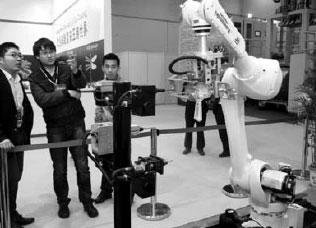Though Japan was long considered the "robotics kingdom", China surpassed it as the largest market for industrial robots in the world in 2013, when a record-high 36,000 units were sold, Chinese media report.
Now domestic robot makers need to sharpen their edge in technological innovation to become competitive and take a bigger share of the huge market, experts said.
On average worldwide there are 55 industrial robots for every 10,000 employees, but the rate in China is just 23, according to a patent analysis report released by a research team at the State Intellectual Property Office.
"Based on this projection, China will be a colossal market in industrial robots if it catches up with advanced countries in use intensity," Cui Boxiong, head of the research team, told the Economic Daily.
With rising labor costs in China and a drop in robot prices, the total market value is projected to range from 720 billion yuan ($117 billion) to 1.8 trillion yuan in the next decade, Luo Baihui, vice-president of the Robot Technology Association in Dongguan, a manufacturing hub in Guangdong province, told the newspaper.
The enormous potential has drawn leading companies to accelerate expansion in China.
Swiss conglomerate ABB moved its global robotics headquarters to Shanghai in 2006 and set up R&D centers in the country.
An industrial robot production plant by Japanese manufacturer Yaskawa Electric Corp began operation in Changzhou, Jiangsu province in 2013 with a designed yearly capacity of 12,000 units.
The two companies, together with Fanuc from Japan and Kuka based in Germany, sold 27,000 units in China last year, 74 percent of the total.
"When such traditional robot powerhouses secure market shares in emerging economies including China, all of them deploy their patent resources to gain a monopolistic position in both the market and technology."
The report shows that more than 7,000 robotics patent applications from abroad had been filed with SIPO by 2013, the majority from Japan, the United States, Germany and South Korea.
The research team said the weak performance by Chinese companies is due to their shortage of core technologies.
Qu Shujun, deputy director of the SIPO Beijing center for patent review and coordination, said fledgling domestic makers of industrial robots also rely on imported servomotors and speed reducers, crucial components that affect competitiveness in pricing.
"Japanese companies have a perfect patent strategy in mainstream robotic technologies concerning speed reducers and control systems, leaving their competitors limited space for development in the same technology direction," Qu said.
Xu Xiaoming, chief of a mechanical invention examination department at SIPO, suggested increasing filings for peripheral patents to seek cross licensing while investing more in core technology R&D.
After years of effort, China has made breakthroughs in robotic theories and technologies. Tsinghua, Tianjin and Zhejiang universities ranked among the global top 20 applicants for industrial robot patents from 2010 to 2013, according to the SIPO report.
Guo Zheyu, director of the SIPO Beijing center's mechanical invention department, said "it evidences the domestic industry's improvement in R&D capacity".
"Yet R&D forces cluster around research institutes rather than companies, hindering industrialization of their patents," Guo said.
Experts called for increased cooperation between institutes and the business community to strengthen the R&D foundation at domestic companies.
zhuanti@chinadaily.com.cn
|

Japanese-brand industrial robot on display at an expo in Suzhou, Jiangsu province. Wang Jiankang / China Daily
|
(China Daily 08/13/2014 page17)

